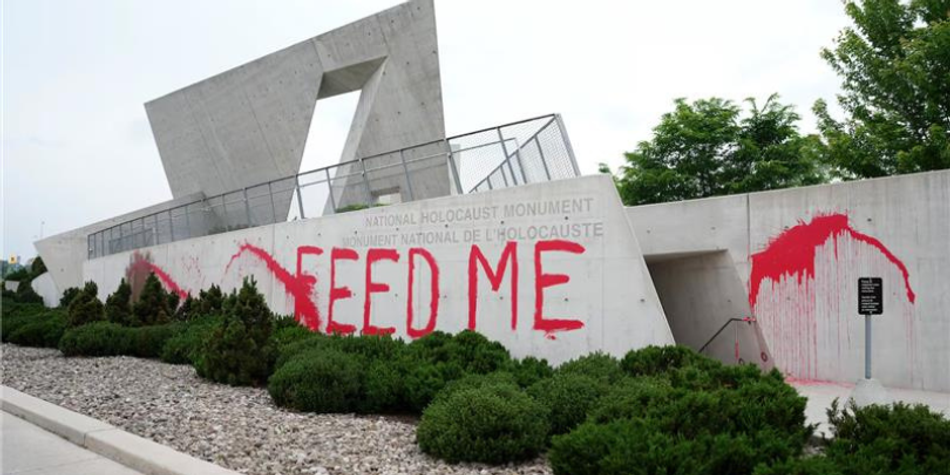80-Year Holiday From History. It’s Over.

We’ve had an 80-year holiday from history — a brief pause in the centuries-long cycle of exclusion, scapegoating and violence. That holiday is now over.
As the school year wraps up, and with 2025 marking 80 years since the end of World War II, it’s time to ask hard questions about what we’re teaching — and what we’re missing.
We’ve had an 80-year holiday from history — a brief pause in the centuries-long cycle of exclusion, scapegoating and violence. That holiday is now over.
As the school year wraps up, and with 2025 marking 80 years since the end of World War II, it’s time to ask hard questions about what we’re teaching — and what we’re missing.
Antisemitism in Canada is no longer simmering beneath the surface. It’s loud, brazen and increasingly violent. Jews are being told we don’t belong — in our schools, our neighbourhoods, our cities. While Jewish schools across Canada have been a target of violence, public schools have also seen a massive uptick of antisemitic rhetoric. And yet, somehow, people still ask: How can this be happening?
Just this week, the National Holocaust Monument in Ottawa was defaced — a stark and shameful reminder that even memory itself is under attack. The monument stands not only to commemorate the past, but to warn the present. Its desecration is not an isolated act of ignorance; it’s a symptom of something deeper, more dangerous — and growing.
We are shocked — but also disoriented. For the past three generations, many Jews in Canada have experienced something unprecedented: a remarkable period of welcome. We were invited in, embraced, assimilated. We took leadership roles, shaped cultural life, became, in a sense, part of the Canadian mainstream.
And now? Now we’ve been jolted awake by a painful truth: the welcome was conditional.
We’ve had an 80-year holiday from history — a brief pause in the centuries-long cycle of exclusion, scapegoating and violence. That holiday is now over.
And while this awakening is most deeply felt in Jewish communities, it cannot remain our burden alone. Antisemitism is a threat to democratic life, not just Jewish life. The integrity of our classrooms and the health of our civic discourse depend on others speaking up. Holocaust education was never meant to be a siloed, Jewish project. It is a call to conscience — and in this moment, that call must be answered by everyone.
What’s even more jarring is that the very tool we believed would protect us — Holocaust education — appears to be faltering.
A critical mistake was made. In the effort to ensure “never again,” the Holocaust was universalized to such an extent that its specificity was stripped away. Its horrors were collapsed into broad “lessons” about tolerance and human rights, applied to issues ranging from bullying to environmental injustice. In the process, the ideological clarity that defined the Holocaust as a distinct and targeted genocide was blurred.
Holocaust education must be rethought, rebalanced and deepened.
For many Canadian students, their first — and often only — exposure to Jewish identity comes through Holocaust education. While that education is vital, and central to our work at the Azrieli Foundation’s Holocaust Survivor Memoirs Program, it cannot be the only lens through which we see Jewish people. We must teach Jewish life — not just Jewish death.
Jewish peoplehood spans thousands of years, across every continent, rich with joy, resilience, tradition and creativity. When students understand the full picture — the diversity, the intersectionality, the rootedness — they’re better equipped to recognize and confront antisemitism. They’re also more likely to build authentic relationships with Jewish peers and see Jewish experience as part of the broader Canadian story.
The good news? This doesn’t require an overhaul of curriculum. It just requires intention.
Many provinces already provide natural entry points — in units on immigration, identity, social justice or Canadian history. What’s needed now is the courage to teach with clarity and specificity. To define terms. To resist oversimplification.
Genocide is not just another word for injustice. Antisemitism is not just another form of racism. These ideas have specific histories and impacts — and they must be taught accordingly.
We also need to shift our educational goals. For decades, Holocaust education focused on tolerance. Then empathy. Today, we need something more: the ability to discern truth from propaganda — and the will to name what we see.
So, what do we want students to walk away with? Until now, we asked them to “never forget.” But now, we must also ask them to understand — and to act.
To truly honour the legacy of Holocaust survivors and safeguard Jewish life today, we must move beyond teaching solely the moral failures of the Holocaust. We must also teach what followed: Jewish survival, renewal and pride.
This is the moment to be courageous—in education, in leadership and in identity. Jewish Canadians must not shrink in the face of hostility. Be visible. Be vocal. Be proud. And to our allies: this is your fight, too.
The holiday from history is over. But history isn’t just something that happens to us—it’s something we shape. The work begins again—with clarity, with courage and with the conviction that truth still matters.
Jody Spiegel is the Director of the Holocaust Survivor Memoirs Program at the Azrieli Foundation. Jody sits on the National Holocaust Monument Exhibit Advisory Panel. She is also a Canadian delegate to the International Holocaust Remembrance Alliance (IHRA) on the Education Working Group and Committee on Antisemitism and Holocaust Denial.
This essay appeared in print and online in the Ottawa Citizen.

